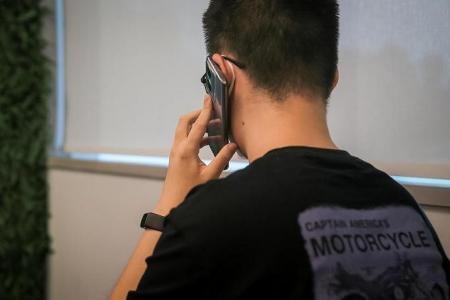Scam victim told to fake hostage situation, smear ketchup on himself to scare mum
A 16-year-old Chinese national was tricked into staging a hostage situation to frighten his mother after he was accused of smuggling contraband cigarettes to Singapore and other offences.
In late August, Ethan (not his real name), who is studying in Singapore, received a call from a bogus "Ministry of Health" here accusing him of spreading Covid-19 rumours in China and the smuggling offence.
Knowing he was innocent, he refuted the accusations, but the caller then told him his mother could have given his personal data to malicious actors who committed those crimes using his identity.
The caller added that the "China police" would contact him for further investigations.
When the "China police" called him, Ethan was told that his mother was involved in money laundering and was asked to stage a hostage situation to get her to confess.
Though Ethan, who is close to his mother, did not believe that she would implicate him or was involved in money laundering, the Secondary 3 student was afraid of the consequences of the law and agreed to stage the hostage situation.
During a media interview on Wednesday, he said: "I knew I had never committed those crimes. But I was scared that if I didn't comply (with the police), I wouldn't be able to return to China... I was scared I would go to jail."
He said he was also worried for his mother as "money laundering is a serious crime in China".
In China, anyone convicted of money laundering can be jailed for up to 10 years and faces a fine of between 5 per cent and 20 per cent of the sum laundered.
The scammers told Ethan not to communicate with anyone while police investigations were ongoing.
On Sept 12, he was instructed to leave his student hostel to stage the hostage situation. The scammers arranged for a vehicle to take him to an unknown location to film a video of himself with his hands bound on a sofa.
To make the video more realistic, Ethan was instructed to buy ketchup from a nearby mall and smear it all over himself to make it look as though he was injured. He also stuck bandages on his body.
Ethan said: "I thought it was very strange (to do so), but I had no evidence it was a scam. I did not dare to ask for help or tell anyone because I believed there would be serious consequences."
The scammers later sent the video to Ethan's mother in China and demanded a 1 million yuan (S$200,000) ransom in exchange for Ethan's safe return.
It is not known how they had her contact details and Ethan's personal particulars.
Fortunately, his mother, a designer in her 40s, did not accede to their request.
On Sept 13, Ethan was safely located by the police, who told him he had fallen victim to a China official impersonation scam. They had received a report the day before after the hostel staff discovered his absence.
Ethan was one of two victims of such scams who spoke about their ordeal during a media interview arranged by the police.
The other victim, a 24-year-old Chinese national who arrived in July to enrol in a master's programme at a university here, was also told to film a video of himself being bound to assist the China police's investigations. He had been accused of attempting to import illegal Covid-19 medicine into Singapore.
Reflecting on his experience, Ethan said: "My mum was very worried when she thought I was injured. I feel so guilty when I think about how my teachers and friends had sent me messages to ask where I had gone.
"I should communicate more often with my parents and guardian and will not believe others so easily in future."
From January to August 2022, a total of 476 China official impersonation scams were reported with losses amounting to at least $57.3 million.
The figures are similar to those for the same period in 2021, with the police recording 474 such cases with victims losing at least $61.9 million.
A total of $227.8 million was lost to the top 10 scam types in the first six months of 2022, up from the $142.5 million lost in the same period in 2021.
How to avoid scams
• Ignore calls, especially those from unknown parties and originating overseas
• No government agency will ask for payment or personal information through a phone call or messaging platforms.
• Foreigners living in Singapore can verify the claims made by callers who say they are police officers from their home country by contacting their embassy or high commission.
• Hang up the call if in doubt and check with the Singapore police
Source: Singapore Police Force
Get The New Paper on your phone with the free TNP app. Download from the Apple App Store or Google Play Store now


